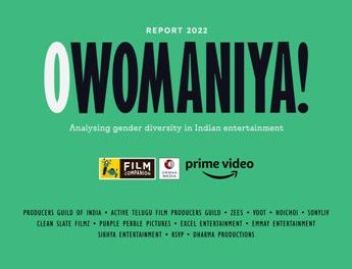 19th September, 2022
19th September, 2022Media consulting firm, Ormax Media and entertainment platform, Film Companion recently released O Womaniya! 2022, the most definitive report on female representation in Indian entertainment.
The report is supported by Prime Video, India’s mostloved entertainment hub. The report highlights on-screen and off-screen representation of women, by analyzing 150 theatrical films, streaming films and series released in 2021 across 8 Indian languages (Hindi, Telugu, Tamil, Malayalam, Kannada, Punjabi, Bengali and Gujarati). In a first, the report received collaboration from multiple entities within the media and entertainment industry. This includes industry bodies like the Producers Guild of India and Active Telugu Film Producers Guild, streaming services like hoichoi, SonyLIV, Voot and ZEE5, along with film leading film studios like Clean Slate Filmz, Dharma Productions, Emmay Entertainment, Excel Entertainment, Purple Pebble Pictures, RSVP and Sikhya Entertainment.
The report studied the representation and participation of women across three major categories –‘content’ that included female representation on-screen and behind-the-camera, ‘marketing’ that studied female representation in promotional trailers of films and series, and ‘corporate’ that analyzed female representation in board rooms of top 25 media and entertainment firms. Key findings of the report include:
Low representation off-screen:
Women have low representation behind-the-camera with only 10% head of department (HOD) positions across key divisions (production design, writing, editing, direction and cinematography) held by women. Out of the 56 theatrical films analyzed across languages, not even one was directed or edited by a woman. Even in media and entertainment corporate houses, that are at the center of decision-making, only 10% of senior leadership roles were held by women, having a cascading effect on inclusivity through the production and execution chain.
Low representation on-screen:
Only 55% of the films and series passed the Bechdel Test1. Even in promotional trailers analyzed through the Trailer Talk Time Test2, women had only 25% talk time with 48 titles even allocating 10 seconds or less to female characters.
Women hire more women:
The percentage of female HODs doubled when a woman greenlit a series or a film. Similarly, a higher percentage of films passed the Bechdel Test (68%) and women had higher trailer talk time (35%)if the title was commissioned by a woman.
Streaming is driving the change:
Streaming films and series performed better than theatrical films across all parameters indicating the change the sector is ushering in representation on and off-screen. For instance, representation of female HODs in streaming films and series was five times higher than theatrical films. Similarly, 64% of streaming series and 55% of streaming films passed the Bechdel Test, as opposed to more than half of theatrical films failing it. Likewise, streaming films and series provided more talk time to female characters in trailers, leading theatrical films by 10 percentage points and 14 percentage points respectively.
O Womaniya! 2022 was also supported by actor Vidya Balan, who over the last 17 years, has led and furthered the mandate on female-led stories across theatrical and streaming films like The Dirty Picture, Kahaani, Tumhari Sulu, Shakuntala Devi, Sherni, Jalsa, and more.
Reacting to the findings shared in the report, Vidya Balan said, “As an actor, I have noticed the change in female representation in films in the last decade and a half. From seeing just a handful of women on sets to now having women lead film-making by taking charge of direction, editing, and other key departments, we have come a long way. While this change has been underway for a while,it’s now become stronger with streaming services that have introduced the much-needed diversity in storytelling and on sets. However, the report indicates that we still have a lot of ground to cover. And this can only happen when we have more women in the boardrooms, prompting change right at the heart of decision-making. As female actors in positions of influence, we need to push for more female representation behind the camera in order to have more sensitive, authentic and relatable representation in front of it too. We now need to move the needle from intention to action, and work towards minimizing and disrupting biases.”
Read the entire report here - www.owomaniya.org
